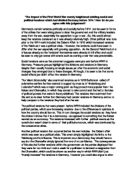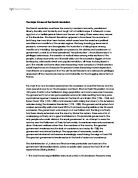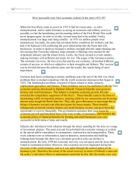Explain whether you agree or disagree with this statement - "The league of nations failed during the 1930's simply because it faced greater challenges then it did in the 1920's".
Mark Cranshaw 1P History Essay Explain whether you agree or disagree with this statement - "The league of nations failed during the 1930's simply because it faced greater challenges then it did in the 1920's" The League of Nations was set up at the end of the First World War in 1919. It began with Woodrow Wilson; he devised his 14 point plan. At the treaty of Versailles in the same year these points were rejected (mainly by France, who thought Germany deserved to be crippled for her actions during the war), but 3 of these points were kept; "National self determination", "open diplomacy" and "the league of nations was to be set up". These would ensure peace was kept and also that there were no more alliances and no more secrets. The main aims of the League were: * World peace * Disarmament The league tried many tactics to help to strengthen itself and work towards these aims. In 1921 there was a conference at Washington. At this Britain for the first time ever accepted parity over her navy. There was another conference at Geneva in 1924. At this countries agreed to arbitration - to talk if any problems occurred. In 1925 the Locarno pact was signed; countries promised to respect each others borders. In 1928 the Kellogg - Briand pact was signed. 65 countries agreed to abolish war, (the only exception of war was in self defence). Finally in 1932 a disarmament conference
Russia in Revolution, 1905-1917
Russia in Revolution, 1905-1917 a) Source 2 reveals that the attitudes of the workers and soldiers in the soviets towards the provisional government in April 1917 were positive and they were willing to work with them. However they were monitoring the provisional government to make sure that they did as the soviet wanted. "The all Russian conference of the soviets of workers and soldiers deputies recognizes that this program includes the basic political demands of Russian democracy" the statement later says " and that so far the provisional government has, on the whole and in general, been fulfilling the obligations which it assumed." b) In April 1917 Lenin returned to Russia, after 1896, when he was arrested and sentenced to three years internal exile in Siberia. On his release in 1900 Lenin decided to leave Russia, and moved to Geneva in Switzerland. When Lenin returned to Russia on 3rd April, 1917, he announced what became known as the April Theses. Lenin attacked Bolsheviks for supporting the Provisional Government. Instead, he argued, revolutionaries should be telling the people of Russia that they should take control of the country. In his speech, Lenin urged the peasants to take the land from the rich landlords and the industrial workers to seize the factories. The reason why Lenin decided to return to Russia was because whilst the tsar was away on the eastern front,
Why did war break out in Europe in 1939?
Why did war break out in Europe in 1939? Hitler came to power in 1933. One of his first actions was taking Germany out of the League of Nations, this was supported by most Germans citizens because they thought that the treaty was unfair and as the members of the League of Nations did nothing about it Hitler gained confidence to keep up with his plans. As Hitler wanted to rearm he reopened German factories giving German citizens employment's back again, as Britain and France did nothing about it Hitler got each time more and more confidence. Meanwhile Hitler began with a massive rally of fascist propaganda, he also made a strong camping against communism speeding "the master race" idea. Hitler took part of Austria and non Britain or France did nothing about it. After these in 1935 Hitler began a massive rearmament program celebrating the "German Armada Forces", and in 1936 he reintroduced conscription in the German army. In this same year Japan, Italy and Germany signed the "anti-Communist Pact". A very significant action was when Hitler sent troops into the Rhineland, with this action Hitler broke international agreements to maintain that area un-militarised. This action was specials threaten to France. As Britain refused to send troops against Germany, war did not start. Hitler tried his new weapons in the Spanish Civil War bombing for the first time in history
Using all the sources and your own knowledge, assess how far Hitler was successful in creating a social revolution?
Using all the sources and your own knowledge, assess how far Hitler was successful in creating a social revolution? It was Hitler's aim to create a genuine Volksgemeinschaft, a classless society of racially pure Aryan Nazism. Within Volksgemeinschaft people were expected to abandon ties of family, religion, class and region. In order to achieve this it was necessary to merge each segment of society to each other. Hitler set about first with the working class; he recognised that this would be his greatest domestic challenge. Although some skilled workers had supported the Nazi's before 1933, most workers had been committed to the socialist SPD and communist KPD. Hitler was intent on creating a disciplined workforce which would not challenge his dictatorship or threaten his plans of re armament with excessive wage demands! In order to create this it was seen necessary to eliminate the trade unions, which in theory, had the prowess to resist Hitler. On the day after May Day 1933, the offices of trade unions were ransacked, and within a few days Nazi's had control of 169 trade union organisations. This was a crucial step for Hitler as it now game him opportunities for mass propaganda. Source 2 gives us some idea of what may have been said to the working class in the drive to inspire and create Volksgemeinschaft. " I desire and command you, that you take the people's community,
What were the obstacles to German Unification immediatly before the 1848 Revolutions
What were the obstacles to the Unification of Germany by the beginning of 1848? Germany in 1848 was an almost unrecognisable place compared with Germany of today and even by the Germany of 1890, the main reason for this is not geographical, because its borders are not that different from 1848, or economically but political, Germany was not a Federal Republic but a group of 39 separate autocratic states ruled by Princes, Kings and even other countries unwilling to lose power and so unification was not even considered as an option at this time. It was not just rulers of the states that opposed German unification, there were a great many other obstacles, which I will discuss, therefore the forces against Unification greatly outweighed the forces of nationalism driving it. So you cannot simply describe Germany as a nation but more of a group of countries grouped by language and geography. Also the political sway of Austria and Prussia prevented even the publication of statements calling for unification, many modern historians consider the Vormärz period as a time when nationalism and liberalism in Germany were suppressed by the German rulers, most notably Austria. With the suppression of Nationalism and Liberalism, the cause for a united Germany could never be expressed publicly and gain support, exactly as people like Prince Metternich wanted. Germany in the period prior
In what ways, and how deeply was German Society divided in the early Twentieth Century?
In what ways, and how deeply was German Society divided in the early Twentieth Century? The 'Prussification' of Germany by 1920 brought about a huge economic and industrial expansion. In trend with this vast economic growth the German population shot from 41 to 65 million by 1910. Notably by 1914 around 60% of the population resided in the inner-city, driven there in search of industrial work and by the end of the First World War, Germany's urban based workforce was second only to that of the United States of America. This period of frenzied economic and population growth created chasms within German Society, with severe consequences for class and religious ties. Significantly by 1920 there were imposing class divisions within German Society, notably revolving around gap between the ostentatious conservative elites, whose stronghold was centred in the East Elbian provinces of Prussia and the German working class. The upper class echelons of the German industrial society centred mainly around the landowning aristocracy of the 'Junkers' and the steel and coal barons of the industrial area of the Ruhr, however also including the officer core of the Prussian Army. These so called elites were, in the main, small social groups who exerted the most power in Germany due to their position of wealth and influence. Typically they were hard, ruthless and domineering men, who on the
Was Napoleon a Great General?
Was Napoleon a Great General? Napoleon inherited an army which made up for its lack of skills simply through its huge numbers. The Levee én mass, an early form of conscription, was responsible for this. As soon as Napoleon gained power he began reforming the army. Owing to his large political power he was able to pass laws very easily. However, later on he found that being both General and politician had its drawbacks. Napoleon's army was split into divisions. This made supplying easier, as supplies were ordered for a division rather than an army, although the coordination of attacks across divisions was obviously made more difficult. Furthermore a corp. system, seemly confusing the matter further, was implemented. It consisted of 3 infantry divisions, 1 cavalry division and 46 guns. One corp. had enough firepower to survive by itself and several could spread out to forage for greater self-sufficiency. Foraging was so successful for Napoleon that in the Prussian and Polish campaigns the armies actually made money for the government. When these corps were combined they could attack from separate directions cutting supply lines and causing general panic and confusion, as was seen at Austerlitz. Napoleon also favoured this corp. system for his 'divide and conquer' tactic. He hoped that by launching attacks at the enemy's centre he could split their forces, allowing
How Far Was Stalin personally Responsible For The Great Purges?
Mark Weale How Far Was Stalin personally Responsible For The Great Purges? Under Stalin's leadership, approximately 70 000 people were murdered during the purges of 1928 to 1940, and some 12 million people died as a result of Stalin's sending them to the Gulags otherwise known as the camps, and these estimates are described as being conservative. Many historians believe that up to 17 million people could have died as a result of Stalin's purges. Was this due to Stalin's paranoia, or were other factors involved in these huge numbers of dead? After Lenin's death, Stalin succeeded him as leader after a gap of about three years. He had achieved his position through skilful maneuvering and ruthlessness in his dealings with fellow party members. Stalin had been brought up as a Georgian peasant, but his lack of regard for his fellow human beings had been shown by his brutal repression of Georgia in Sept 1918. Stalin was willing to use whatever means necessary to achieve his goals. After Stalin took over the leadership in 1928, huge advances occurred in the state of Russia's economy, and Stalin succeeded in changing Russia from a backward power, restrained for many years under the ties of repressive, incompetent Tsars, into a world Superpower, capable of sustaining an arms race requiring military expenditure of up to 15% per year. This modernization of Russia was achieved in an
Essay Plan - What was the main opposition to the Nazi regime, and why didn't Nazism face more opposition ?
Lloyd Mckinney Essay Plan What was the main opposition to the Nazi regime, and why didn't Nazism face more opposition ? Introduction - An introduction to an answer for this type of question should consist of some background information, mainly about the strength and the fear factor of the Nazi's. Including details of how the German people were the main opposition to the Nazi regime and not any specific group. Moving on to say how there were many reasons why the Nazi's didn't face more opposition but not stating them yet. This section of the essay would start to delve into what was the main opposition to the Nazi regime. The people. This would be a relatively large paragraph consisting of all the information about the peoples resistance to the Nazi's. The different types of resistance, for example passive resistance ( Joachim Gottschalk ), or active resistance ( Colonel Claus Schenk Graf von Stauffenberg ). This section would include quotes and examples of many different Nazi resisters, and details of their punishment for use later in the essay when talking about why the Nazi's didn't face more opposition. Focusing on different groups of people in this section would be useful, for example stating how people from all walks of German life were opposing the Nazi regime and how it wasn't just one group. Towards the end of this section I would include details of how I believe
Was the coronation of the Kaiser in 1871 mainly a military or mainly a diplomatic achievement?
Was the coronation of the Kaiser in 1871 mainly a military or mainly a diplomatic achievement? King William I, King of Prussia was proclaimed Kaiser. This had been accomplished largely through political maneuvering with the aid of a military drive to enforce diplomatic terms. This drive had originated mainly from the German Chancellor, Otto von Bismarck, who played a key role in the coronation of the Kaiser. From his early political dominance, Bismarck built and unified Germany through wars in order to create a stronghold for his ideal king. Bismarck's political career began in 1847, elected to the Prussian United Diet marked his entry into public life. He got involved in counter-revolutionary plots, during the March days of the Berlin riots, 1848, he was a member of the right-wing Junker Party and was excessively anti-liberal, quoting: ' Only two things matter for Prussia, to avoid and alliance with democracy and to secure equality with Austria.' Bismarck showed great political capability and was then awarded the title of Prussian ambassador in Austria, until 1859. His anti-Austrian policies and nationalistic ideology grew, creating a division between him and his Prussian counter parts. By the 1860's Bismarck already had a reputation for being a tough, able politician, ambitious and ruthless, and because of this Bismarck could afford to seek agreements through diplomatic



























